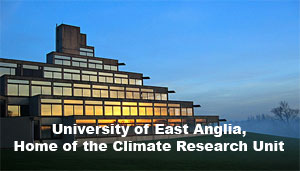The growing scandal over the so-called “Climate-gate” emails is an interesting story on its own, but, ultimately, might also have a significant impact on Green supply chain practice.
In the past week, a significant number of emails and documents from the Climate Research Unit (CRU) at the University of East Anglia near Norwich, England were publicly released by a “hacker,” possibly a former employee of the CRU.
The CRU has been a major source of data on global temperatures, at one time housing the raw data from temperature sensors around the globe that were said to show a warming trend. The CRU numbers, in turn, became the foundation of analysis and recommendation by hundreds of other researchers, governments and environmental organizations, including the Intergovernmental Panel on Climate Change and
Many of the leaked emails certainly paint a picture that the CRU may have been suppressing data that did not support the position that global warming caused by human CO2 emissions was a large and growing threat to the planet.
A sample of those emails, which expressed concern about the lack of evidence to prove the threat of global warming and even made one reference to a plan to "hide the decline" in temperatures, include the following:
"I can't see either of these papers being in the next IPCC report. Kevin and I will keep them out somehow -- even if we have to redefine what the peer-review literature is!"
"Can you delete any e-mails you may have had with Keith re AR4?"
"I've just completed Mike's Nature trick of adding in the real temps to each series for the last 20 years (i.e., from 1981 onwards) and from 1961 for Keith's to hide the decline."
"The fact is that we can't account for the lack of warming at the moment and it is a travesty we can't."
"I'm getting hassled by a couple of people to release the CRU temperature station data. Don't any of you three tell anybody that the UK has a Freedom of Information Act!"
Those emails led The Atlantic magazine’s Megan McArdle, generally a supporter of global warming theory, to write last week that "The CRU's main computer model may be, to put it bluntly, complete rubbish."
All this as US President Obama and many other world leaders are headed to Copenhagen for a UN-sponsored climate summit, which was already generating controversy when the US and China said the meetings would not result in any sort of binding agreement between nations (See No Binding CO2 Treaty will Come out of Copenhagen Summit.)
The Heritage Foundation's Ben Lieberman said that the e-mails serve to undercut the entire Denmark conference.
"This raises questions about some of the very U.N. science that forms the basis of what's going to be discussed in Copenhagen," he said. "There's a lot to be concerned about here. At the very least, the president shouldn't agree to anything in Copenhagen until we get to the bottom of Climate-gate and find out just how much there is to global warming science that we can still trust."
Impact on the Green Supply Chain
The potential impact of Climate-gate in Green supply chain practices comes in two forms:
- The incident may or may not ultimately lead to more doubts about global warming theory, and/or more fresh and less politically correct research that opens up the whole subject again.
- More likely and nearer term, the emails may further dampen enthusiasm in the US Senate for Cap-and-Trade legislation, similar to a bill that has already passed the US House. Indications already were that the Senate would not take up Cap and Trade in earnest until well into 2010, amid the focus on health care, concern about the impact of the legislation on a still creaky economy, and doubts about the bill among several moderate Democrats.
 Whether Cap and Trade is passed will have a huge impact on Green supply chain thinking. Without Cap and Trade, Green supply chain initiatives are almost solely up to an individual company’s agenda and beliefs. This means they are likely to be focused on projects that have an ROI to them, and/or to gain some advantage with consumers from being perceived as friendly to the environment. Whether Cap and Trade is passed will have a huge impact on Green supply chain thinking. Without Cap and Trade, Green supply chain initiatives are almost solely up to an individual company’s agenda and beliefs. This means they are likely to be focused on projects that have an ROI to them, and/or to gain some advantage with consumers from being perceived as friendly to the environment.
Cap and Trade, depending on how it is implemented, adds a real cost to carbon emissions, and one that is potentially unpredictable, as emission “permits” would ultimately be priced in a dynamic market.
In other words, under Cap and Trade, carbon emissions from the supply chain become regulated; without it, carbon emissions and abatement programs are voluntary and based on what a company perceives its own interests to be.
Whether Climate-gate is truly a smoking gun, or simply expresses unimportant side comments from CRU researchers remains to be seen. Several government agencies here and in the UK are calling for formal investigations. How all this plays out will have a major impact on how we think about the Green supply chain over the next 10 years.
Do you think Cimate-gate will have any real impact on Green supply chain trends? Is it likely to push out any Cap and Trade legislation in the US? Let us know your thoughts at the Feedback button below.

TheGreenSupplyChain.com is now Twittering! Follow us at www.twitter.com/greenscm
|